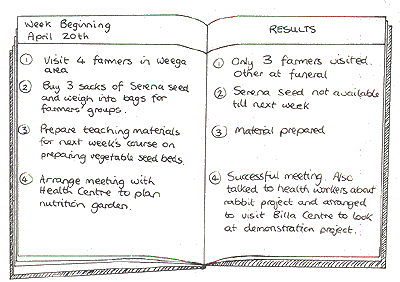by Jerry Adams.
What do we mean by project monitoring?
It means to keep a careful check of project activities over a period of time.
Why should we monitor a project?
Surely if everyone is doing their best, things will go well?
To work to its full potential, any kind of project needs to set out proposals and objectives. Then a monitoring system should be worked out to keep a check on all the various activities, including finances. This will help project staff to know how things are going, as well as giving early warning of possible problems and difficulties.
How can a project be monitored?
- Keep it simple
Remember… monitoring is meant to be a help to good project management and not a burden. - Objectives
Work out clearly at the beginning the objectives of the project, including a budget of the likely cost (expenditure). - Plan the activities
- what needs to be done
- when it should be done
- who will be involved in doing it
- what resources are needed to do it
- how long it will take to do
- how much it will cost. - Monitoring
Work out the most appropriate way of monitoring the work - again, keep it simple:
- meetings
- diaries
- reports on progress
- accounts, reports on finances.
Monitoring methods
- Reports
These do not have to be very long. Their purpose needs to be clear - to report on activities and achievements. Above is an example of the records kept by ASHA in India. They give a clear and helpful record of exactly what has been achieved. They are short and to the point. This kind of report will help them in future planning and would clearly inform the Government or a donor agency of what has taken place.
The ideal report - like this one below written by ASHA in India - is short and to the point.
|
Objectives |
Outcome |
Evaluation |
|
Consciousness raising 1 Conduct 18 courses. (average size 18) |
19 courses held: 10 for men, 9 for women. Total participants 332 Average size 17.5 Course Length 3 days |
These courses are very effective in motivating group members. Groups have been transformed when members have received this training |
|
Group management Design module. Conduct 11 courses. (average size 18) |
Module designed. 5 courses held. Total participants 63 Average size 12.6 Course length 3 days |
Purpose of course was to provide training in keeping group records. Because so many members are illiterate, there were not sufficient members to join these courses. Instead, we are now teaching the subject at each group meeting. |
|
Conduct 5 Child Literacy courses |
This program has been postponed |
We decided that this program should be done when whole villages have been mobilised. We are not at this stage yet. |
- Diaries
A helpful way of recording information would be to use one side of a note book for example, for daily or weekly plans. Write on the other side what actually happened. Keeping a work diary like this will help you also to evaluate your own work. What are you doing that is most helpful and brings effective results? Take time to ask people in the community about how they feel.










